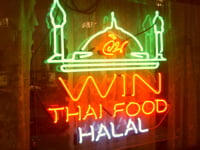 One of the things that makes America special is our food. We have a unique way of taking cuisines from all over the world–China, Mexico, and Italy come to mind–and putting an American twist on it. We have managed to elevate eating out to an art form, and it has a special place in American culture.
One of the things that makes America special is our food. We have a unique way of taking cuisines from all over the world–China, Mexico, and Italy come to mind–and putting an American twist on it. We have managed to elevate eating out to an art form, and it has a special place in American culture.
But for Muslim Americans who abide by halal dietary restrictions (similar to Jewish kosher rules, but not as stringent), eating out has presented a challenge. Where can Muslims go without having to resort to vegetarian options? (Although, thankfully, there are an increasing number of good vegetarian restaurants available.) The answer is the halal restaurant–defined not by cuisine type, but by the use of meat slaughtered after the Muslim invocation to God.
Ten years ago, I started a website called zabihah.com, which lists and reviews halal restaurants throughout the world. At that time, there were a relative handful of halal restaurants in the U.S.–perhaps 200 at most–and it was difficult for these restaurants to attract a critical mass of Muslim customers to justify the additional expense of halal meat.
Today, however, that number has grown to nearly 4,000, and those restaurants have a cultural diversity and richness that have contributed to the flavor of the greater American menu. Eating out for the observant Muslim is no longer a chore, and no longer relegated to “back home” food. (American-born Muslims such as myself often want halal food from our own cultural tradition, and that means burgers, pizza, and Philly cheesesteak sandwiches.) There are now districts in most major metropolitan areas in the U.S. where dozens of halal restaurants compete with each other for consumer attention with a wide variety of cuisines, increased quality, and innovations (i.e. fusion cuisine mixing different parts of the Muslim world).
What does this all mean for Ramadan? It means that iftars are moving out of the homes and mosques and into the restaurants, where people can meet and eat out in the open. Restaurants are increasingly seen as places where families or groups of friends can gather for iftar, especially if there is a mosque or other area nearby reserved for the sunset prayer. Some–like the ubiquitous and award-winning halal sidewalk carts of Manhattan–even offer iftar to-go plates for professionals on the run between work and home.
There’s an opportunity here for those curious about experiencing Ramadan first hand. Make a reservation at a halal restaurant, especially those that offer special deals for iftars. Enjoy flavors you might otherwise not be familiar with, and observe the anticipation of the Muslim patrons as the plates of food are brought out. Halal restaurants are just one of the ways that Muslim Americans are contributing to the wider American cultural landscape.

